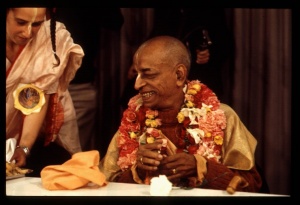770401 - Lecture - Bombay: Difference between revisions
RasaRasika (talk | contribs) m (Text replacement - "Prabhupāda:" to "'''Prabhupāda:'''") |
RasaRasika (talk | contribs) m (Text replacement - "<!-- Nectar Drop Code Start -->" to " <!-- Nectar Drop Code Start -->") |
||
| Line 11: | Line 11: | ||
<div style="float:left">[[File:Go-previous.png|link=Category:Lectures - by Date]]'''[[:Category:Lectures - by Date|Lectures by Date]], [[:Category:1977 - Lectures|1977]]'''</div> | <div style="float:left">[[File:Go-previous.png|link=Category:Lectures - by Date]]'''[[:Category:Lectures - by Date|Lectures by Date]], [[:Category:1977 - Lectures|1977]]'''</div> | ||
{{RandomImage}} | {{RandomImage}} | ||
<!-- Nectar Drop Code Start --> | <!-- Nectar Drop Code Start --> | ||
Revision as of 02:06, 30 October 2023

A.C. Bhaktivedanta Swami Prabhupada
Prabhupāda: . . .and shall remain up to eight. So our darśana and talks, if there is any, generally, every day it will be done. And on Sunday you can fix up some time. I will speak in the evening. And then Kṛṣṇa's desire, as He likes. For the time being, this arrangement.
So what is that verse? Divya-jñāna hṛde prakāśito. Just recite that. (Indians repeat) Before that.
Indian guests: Prema-bhakti yāhā hoite, avidyā vināśa yāte.
Prabhupāda: So the necessity is prema-bhakti. Prema-bhakti yāhā hoite, avidyā vināśa yāte, divya-jñāna. So what is that divya-jñāna? Divya means transcendental, not material. Tapo divyam (SB 5.5.1). Divyam means we are combination of matter and spirit. That spirit is divya, transcendental. Apareyam itas tu viddhi me prakṛtiṁ parā (BG 7.5). That is parā prakṛti, superior. If there is the superior identity . . . And for understanding that superior identity we require superior knowledge, not ordinary knowledge. Divya-jñāna hṛde prakāśito. So this is the duty of the guru, to awaken that divya-jñāna. Divya-jñāna. And because guru enlightens that divya-jñāna, he is worshiped. That is required. The modern . . . Modern or always; this is māyā. That divya-jñāna is never, I mean to say, manifested. They are kept in the darkness of adivya-jñāna. Adivya-jñāna means "I am this body." "I am Indian," "I am American," "I am Hindu," "I am Muslim," this is adivya-jñāna. Dehātma-buddhiḥ. Yasyātma-buddhiḥ kuṇape tri (SB 10.84.13). I am not this body.
So the beginning of divya-jñāna is there when we try to understand that "I am not this body. I am superior element, I am spirit soul. This is inferior. So why should I remain in this inferior knowledge?" We should not remain in the inferior . . . Inferior knowledge means darkness. Tamasi mā. The Vedic injunction is, "Don't remain in the inferior knowledge." Jyotir gamaḥ: "Come to the superior knowledge." So to worship guru means because he gives us superior knowledge. Not this knowledge—how to eat, how to sleep, how to have sex life and defend. Generally, the political leaders, social leaders, they give this knowledge—how to eat, how to sleep, how to have sex, how to defend. A guru has no business with these things. He is divya-jñāna, superior knowledge. That is required. This human form of life is an opportunity to awaken that divya-jñāna hṛde prakāśito. And if he's kept in darkness about that divya-jñāna, simply if he is trained up how to eat, how to sleep, how to have sex and to defend, then life will be lost. That is a great loss. Mṛtyu-saṁsāra-vartmani. Aprāpya māṁ nivartante mṛtyu-saṁsāra-vartmani (BG 9.3). Very risky life if we do not awaken our divya-jñāna. We should always remember this. Very risky life—once again thrown into the waves of birth and death, we do not know where I am going. Very serious. This Kṛṣṇa consciousness is divya-jñāna. It is not ordinary knowledge. Everyone should try to understand this divya-jñāna. Daivīṁ prakṛtim āśritam. Therefore one who is interested in this divya-jñāna, he is called daivīṁ prakṛtim āśritam. From daivī, divya comes, the Sanskrit word. Sanskrit word, from daivī, divya, adjective.
So mahātmānas tu māṁ pārtha daivīṁ prakṛtim āśritāḥ (BG 9.13). One who has taken to this divya-jñāna process, he is mahātmā. Mahātmā is not made by stamping for receiving knowledge how to eat, how to sleep, how to have sex. That is not the definition in the śāstra. Sa mahātmā su-durlabhaḥ.
- bahūnāṁ janmanām ante
- jñānavān māṁ prapadyante
- vāsudevaḥ sarvam iti
- sa mahātmā . . .
- (BG 7.19)
One who has got this divya-jñāna, vāsudevaḥ sarvam iti sa mahātmā, that is mahātmā. But that is very, very rare. Otherwise, mahātmā like me, they are loitering in the street. That is their business. So you should always remember this word, divya-jñāna hṛde prakāśito. And because the spiritual master enlightens the divya-jñāna, one feels obliged to him. Yasya prasādād bhagavat-prasādo yasya prasādān na gatiḥ kuto 'pi. So this guru-pūjā essential. As the Deity worship essential . . . It is not cheap adoration. It is the process of enlightening the divya-jñāna.
Thank you very much.
Devotees: Jaya Prabhupada. (end).
- 1977 - Lectures
- 1977 - Lectures and Conversations
- 1977 - Lectures, Conversations and Letters
- 1977-04 - Lectures, Conversations and Letters
- Lectures - India
- Lectures - India, Bombay
- Lectures, Conversations and Letters - India
- Lectures, Conversations and Letters - India, Bombay
- Lectures - General
- Audio Files 05.01 to 10.00 Minutes